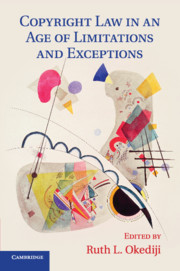Book contents
- Copyright Law in an Age of Limitations and Exceptions
- Copyright Law in an Age of Limitations and Exceptions
- Copyright page
- Dedication
- Contents
- Author Biographies
- Preface
- Introduction
- 1 Justifications for Copyright Limitations and Exceptions
- 2 The Role of the Author in Copyright*
- 3 A Few Observations about the State of Copyright Law
- 4 Fetishizing Copies
- 5 Copyright in a Digital Ecosystem
- 6 The Canadian Copyright Story
- 7 (When) Is Copyright Reform Possible?
- 8 Fair Use and Its Politics – at Home and Abroad
- 9 Flexible Copyright
- 10 The Limits of “Limitations and Exceptions” in Copyright Law
- 11 Lessons from CopyrightX
- 12 Rights on the Border: The Berne Convention and Neighbouring Rights
- 13 How Oracle Erred
- 14 Reframing International Copyright Limitations and Exceptions as Development Policy
- Index
9 - Flexible Copyright
Can the EU Author’s Rights Accommodate Fair Use?
Published online by Cambridge University Press: 07 June 2017
- Copyright Law in an Age of Limitations and Exceptions
- Copyright Law in an Age of Limitations and Exceptions
- Copyright page
- Dedication
- Contents
- Author Biographies
- Preface
- Introduction
- 1 Justifications for Copyright Limitations and Exceptions
- 2 The Role of the Author in Copyright*
- 3 A Few Observations about the State of Copyright Law
- 4 Fetishizing Copies
- 5 Copyright in a Digital Ecosystem
- 6 The Canadian Copyright Story
- 7 (When) Is Copyright Reform Possible?
- 8 Fair Use and Its Politics – at Home and Abroad
- 9 Flexible Copyright
- 10 The Limits of “Limitations and Exceptions” in Copyright Law
- 11 Lessons from CopyrightX
- 12 Rights on the Border: The Berne Convention and Neighbouring Rights
- 13 How Oracle Erred
- 14 Reframing International Copyright Limitations and Exceptions as Development Policy
- Index
Summary
Almost everyone agrees that modern copyright law needs to be flexible in order to accommodate rapid technological change and evolving media uses. In the United States, fair use is the flexible instrument of choice. Author’s rights systems in Europe are generally deemed to be less flexible and less tolerant to open-ended limitations and exceptions. But are they really?
This chapter makes the case that (1) author’s rights systems can be made as flexible as copyright systems, and (2) that the existing EU legal framework does not preclude the development of flexible norms at the national level.
- Type
- Chapter
- Information
- Copyright Law in an Age of Limitations and Exceptions , pp. 275 - 291Publisher: Cambridge University PressPrint publication year: 2017
- 15
- Cited by

